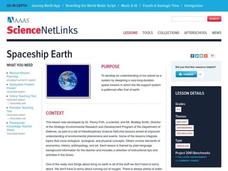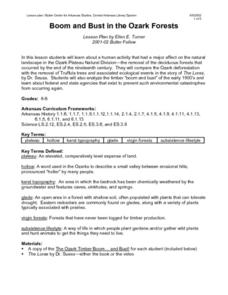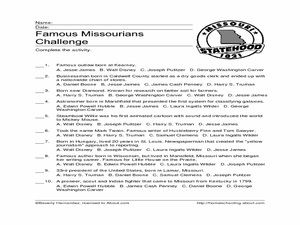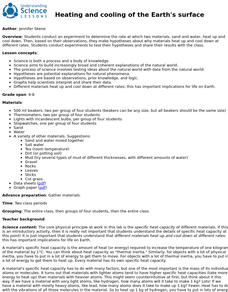Nuffield Foundation
Nitrogen-Fixing Bacteria in Root Nodules of Leguminous Plants
Fixin' to add a great resource to your plans? Scholars perform an experiment to investigate nitrogen-fixing bacteria from plant roots. Along the way, they learn about the concepts of symbiosis and mutualism.
Curated OER
Showdown in the New Wild West
What is the root of the conflict between ranchers and environmentalists? Middle schoolers write their impressions of what an environmentalist is and does. They read the New York Times article "In New Wild West, It's Cowboys vs. Radical...
Curated OER
Spaceship Earth
Middle schoolers develop an understanding of our planet as a system by designing a very-long-duration space mission in which the life-support system is patterned after that of earth.
Curated OER
Observing the Pumpkin Cycle
Students observe and listen to nonfiction books about the life cycle of pumpkins. They practice early reading skills in a shared reading related to pumpkins. They observe the life cycle of a pumpkin including growth and decay.
Curated OER
Boom and Bust in the Ozark Forests
Here is a hard-hitting, cross-curricular lesson plan on the effects that the deforestation of the Ozark forests in the 19th century had on the people, animals, and ecosystems of the area. The Dr. Seuss book The Lorax is used as a way of...
Curated OER
Coal Science Fair Ideas
Learners select one of the ideas for a science project reflecting their knowledge about coal. They then choose a catchy title to spark interest that describes their project. They use the scientific method to explain the process.
BBC
Ourselves
Young biologists identify parts of the body, sort humans from other animals, and list the difference they see. Learners are split up into groups of three, and each group must find pictures in magazines of humans and other animals. They...
Curated OER
Famous Missourians Challenge
In this multiple choice worksheet, students read descriptive sentences and choose the names of the persons being described. Students answer 10 multiple choice questions.
Curated OER
Animal Diseases
Many of the toxins and parasites that cause illness are specified and discussed in this slideshow. Poisoning and other mechanisms by which an animal can fall ill are detailed and the information about frequency, prevention and treatment...
Curated OER
Transport in Plants
Quite a detailed and advanced look at the transport mechanisms of a plant. The absorption and control of sugar and water concentration are explained and will help an understanding of homeostasis concepts and organ specialization.
Curated OER
Group 15, The Nitrogen Group
This short presentation provides a convenient introduction to the nitrogen group in the periodic table of elements. A graphic displays where they are placed in the periodic table. The nitrogen cycle is mentioned and ammonia is explained....
Curated OER
Reading Comprehension: Great Britain
Read to understand! Sounds great and your third graders will read to understand several interesting facts about Great Britain. They read, identify key details in the text, and write to answer five comprehension questions. Learning to...
Curated OER
Dinnertime for Animals
Is a deer an herbivore? What about a spider? Experiment with the food chain in an interactive science experiment. After listing the herbivores from a selection of animals, third and fourth graders compare the skulls and teeth of...
Curated OER
The Plant Food Factory
Plants need sun and water to survive. Let kids discover these facts by reading a block of informational text and considering a scientific quandary. They read the text, then use the information to complete a two-part question about plant...
Southern Nevada Regional Professional Development Program
Pardon Me, Your Modifier is Dangling
Lost! (or misplaced) a modifier. Last seen dangling at the end of a sentence! Reward offered! To underscore the humor, class members are each given a sample sentence to illustrate (A woman passed by, leading a Springer Spaniel, in a long...
Starry Night Education
Comets and Meteors
Comets are also known as dirty snowballs or icy mud balls. With your super scientists, create a model comet nucleus to discover how they are made and take part in a scientific discussion to learn how it behaves.
Wild BC
Carbon Sinks and Sources
Earth or environmental science pupils are assigned to be carbon sources or sinks. They ask yes-or-no questions to try to figure out which one they are. Then they discuss ways people can have positive effects on the changing climate by...
Marine Institute
Water Pollution
Sixth graders investigate the various types of pollutants found in water and ways to help prevent water pollution. Through a hands-on experiment, students create samples of polluted water by mixing water with vegetable oil, dirt, and...
Virginia Department of Education
A-Mazing Plants
Have your young scientists questioned why plants grow a particular way? Through this learning opportunity, scientists gain firsthand knowledge about how plants develop and various factors that affect rates of growth as they bring plants...
Learning Games Lab
Nitrogen in Fertilizer
Nitrogen is an essential element for productive farming. An interactive lesson explores the chemical makeup of different fertilizers and their corresponding nitrogen content. The interactive challenges individuals to complete molecular...
University of California
Heating and Cooling of the Earth's Surface
Scholars collect data from heating sand and water before forming testable hypotheses about why sand heats up faster. Afterward, they develop and run experiments to test their hypotheses.
Curated OER
The Principles Of Composting
Students put items in a plastic bag and watch the effects of composting. While completing the experiment, students answer questions and ask permission to start their own compost pile at home.
Curated OER
Benny's Pennies
Students read Benny's Pennies and predict what Bennie will buy with each penny based on the illustrations. They locate rhyming words and make a chart of what Benny bought and also for what they would have bought.
Curated OER
What's Gotten Into You?
Students use models to investigate the process and consequences of water contamination on the land, groundwater, and plants.

























